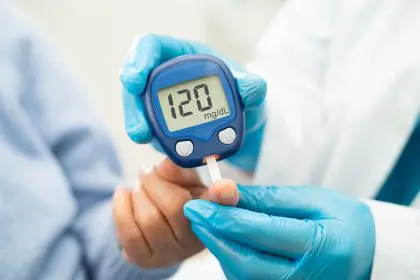Recent statistics from the Centers for Disease Control show that over 88 million American adults are pre-diabetic, with nearly 84% unaware of their condition. While diagnosis can be alarming, research published in the New England Journal of Medicine indicates that dietary changes can reduce the risk of developing type 2 diabetes by up to 58%. Understanding and eliminating certain foods becomes crucial in this journey toward better health.
The science behind blood sugar management
Blood glucose levels are intricately connected to our dietary choices. When we consume food, particularly carbohydrates, our body converts it to glucose for energy. In pre-diabetes, this system becomes impaired:
Key mechanisms:
- Insulin resistance develops gradually
- Beta cells struggle to produce sufficient insulin
- Blood sugar levels remain elevated longer
- Inflammation can worsen the condition
- Metabolic changes affect energy usage
Understanding these processes helps explain why certain foods pose particular risks for pre-diabetic individuals.
Critical foods to eliminate
1. Sugary beverages
Research from Harvard Medical School shows that daily consumption of sugary drinks increases diabetes risk by 26%:
Specific impacts:
- Regular sodas (39g sugar/can):
- Spike blood sugar within 20 minutes
- Trigger excessive insulin release
- Provide zero nutritional benefits
- Contribute to weight gain
Energy drinks (50g+ sugar):
- Combine sugar with caffeine
- May mask fatigue symptoms
- Often consumed in large quantities
- Create addiction-like patterns
Healthier alternatives:
- Infused water recipes
- Herbal tea varieties
- Electrolyte drinks without sugar
- Vegetable-based smoothies
2. Refined carbohydrates
The American Diabetes Association highlights how refined carbs impact blood sugar:
White bread:
- Glycemic index of 75+
- Rapid glucose conversion
- Minimal fiber content
- Often hidden added sugars
Regular pasta:
- Quick digestion rate
- Blood sugar spikes
- Low satiety effect
- Nutrient stripped
Better choices:
- Whole grain options (GI under 55)
- Ancient grains like quinoa
- Legume-based pasta
- Cauliflower rice alternatives
3. High-sugar breakfast items
Morning choices significantly impact daily blood sugar patterns:
Impact of common breakfast foods:
- Sugary cereals (12g+ sugar/serving):
- Morning blood sugar spikes
- Increased hunger later
- Poor concentration
- Energy crashes
Granola bars (15g+ sugar):
- Often worse than candy bars
- Marketing misleads consumers
- Hidden unhealthy fats
- Minimal protein content
Nutritious alternatives:
- Protein-rich options
- Healthy fat combinations
- Fiber-focused meals
- Low-glycemic fruits
4. Processed snacks
Studies show processed snacks contribute to insulin resistance:
Common offenders:
- Chips and crackers:
- Refined carb concentration
- Poor nutrient density
- Often trigger overeating
- Inflammatory oils
Healthier options:
- Nuts and seeds portions
- Vegetable-based snacks
- Protein-rich alternatives
- Healthy fat combinations
5. Baked goods
Research indicates baked goods significantly impact blood sugar:
Problem areas:
- Combined sugar and refined flour
- Hidden trans fats
- Quick digestion rates
- Addictive qualities
Better choices:
- Almond flour alternatives
- Sugar-free baking
- Protein-rich options
- Natural sweeteners
6. Fried foods
Multiple studies link fried foods to increased diabetes risk:
Impact mechanisms:
- Inflammatory response
- Advanced glycation end-products
- Insulin resistance promotion
- Cellular damage
Healthier preparation:
- Air frying benefits
- Steam cooking
- Dry roasting
- Healthy oil selection
7. Sweetened condiments
Hidden sugar sources often overlooked:
Common culprits:
- Ketchup (4g sugar/tbsp)
- BBQ sauce (8g sugar/serving)
- Asian sauces
- Salad dressings
Better options:
- Homemade alternatives
- Sugar-free versions
- Spice-based options
- Vinegar varieties
Meal planning strategies
Successful dietary changes require planning:
Weekly prep:
- Grocery list organization
- Meal preparation
- Snack portioning
- Emergency food plans
Transition timeline
Week 1-2:
- Eliminate sugary drinks
- Track blood sugar response
- Note energy changes
- Adjust water intake
Week 3-4:
- Remove refined carbs
- Introduce whole grains
- Monitor satisfaction levels
- Adjust portion sizes
Week 5-6:
- Address snacking habits
- Implement new alternatives
- Track hunger patterns
- Fine-tune choices
Common challenges and solutions
Frequent obstacles:
- Social eating situations
- Travel complications
- Time constraints
- Cravings management
Solutions:
- Preparation strategies
- Portable healthy options
- Quick meal planning
- Craving alternatives
Implementation strategy
Success requires systematic approach:
- Start with biggest offenders
- Replace one category weekly
- Monitor blood sugar responses
- Track energy and mood
- Adjust based on results
- Celebrate small victories
Progress indicators
Watch for positive changes:
- Stable energy levels
- Reduced cravings
- Improved sleep
- Better concentration
- Lower blood sugar readings
- Weight management
- Reduced inflammation
Moving forward
Pre-diabetes management through diet requires commitment but offers significant rewards. Research shows consistent dietary changes can:
- Reduce diabetes risk by 58%
- Improve overall health
- Enhance energy levels
- Support weight management
- Boost mental clarity
Focus on gradual, sustainable changes rather than dramatic restrictions. Regular monitoring, consistent choices, and patience create lasting results in blood sugar management.
This story was created using AI technology.













